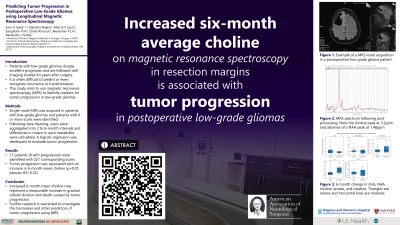Predicting Tumor Progression in Postoperative Low-Grade Gliomas using Longitudinal Magnetic Resonance Spectroscopy
Predicting Tumor Progression in Postoperative Low-grade Gliomas Using Longitudinal Magnetic Resonance Spectroscopy
Friday, April 21, 2023


Sam H. Jiang, BS (he/him/his)
Medical Student
University of Illinois College of Medicine at Chicago
Chicago, Illinois, United States
ePoster Presenter(s)
Introduction: Patients with low-grade gliomas display excellent prognoses with a median survival of 13 years when treated with surgery and chemoradiation therapy. Following treatment, patients are followed with imaging studies for many years, but it is often difficult to predict or even recognize tumor recurrence or transformation. This study aims to use magnetic resonance spectroscopy (MRS) to identify biomarkers that can predict tumor progression in postoperative low-grade glioma patients.
Methods: Single-voxel MRS scans (TE=97ms, TR=2000ms, NA=128) were performed on Siemens 3T scanners in patients with low-grade gliomas. Patients with 6 or more scans were identified. Scans with full-width half-max > 25 or creatine %SD > 50% were excluded from data analysis. Scans were aggregated into 2-6 month intervals and differences in means in each metabolite were calculated. A logistic regression model was developed with the difference in means between each interval as the predictor and tumor progression (tumor enhancement or growth on imaging or repeat surgical resection within 1 month) as the predicted variable.
Results: Seventeen postoperative low-grade glioma patients matching the inclusion criteria were identified, and 221 corresponding scans were used for analysis following data cleaning. Eight patients with 21 corresponding scans displayed tumor progression. The logistic regression showed that tumor progression was associated with an increase in 6-month mean choline (p=0.01, pseudo-R2=0.32), but not with 2-hydroxyglutarate, n-acetylaspartate, lactate, or creatine. There were no significant trends using 2, 3, and 4-month means.
Conclusion : Choline is a marker of cellular turnover, thus the increased 6-month mean choline in patients with tumor progression may represent a measurable increase in gradual cellular division and death. This finding may aid in the early detection of tumor progression. Further research is warranted to investigate this biomarker and other predictors of tumor progression using MRS.
Methods: Single-voxel MRS scans (TE=97ms, TR=2000ms, NA=128) were performed on Siemens 3T scanners in patients with low-grade gliomas. Patients with 6 or more scans were identified. Scans with full-width half-max > 25 or creatine %SD > 50% were excluded from data analysis. Scans were aggregated into 2-6 month intervals and differences in means in each metabolite were calculated. A logistic regression model was developed with the difference in means between each interval as the predictor and tumor progression (tumor enhancement or growth on imaging or repeat surgical resection within 1 month) as the predicted variable.
Results: Seventeen postoperative low-grade glioma patients matching the inclusion criteria were identified, and 221 corresponding scans were used for analysis following data cleaning. Eight patients with 21 corresponding scans displayed tumor progression. The logistic regression showed that tumor progression was associated with an increase in 6-month mean choline (p=0.01, pseudo-R2=0.32), but not with 2-hydroxyglutarate, n-acetylaspartate, lactate, or creatine. There were no significant trends using 2, 3, and 4-month means.
Conclusion : Choline is a marker of cellular turnover, thus the increased 6-month mean choline in patients with tumor progression may represent a measurable increase in gradual cellular division and death. This finding may aid in the early detection of tumor progression. Further research is warranted to investigate this biomarker and other predictors of tumor progression using MRS.
